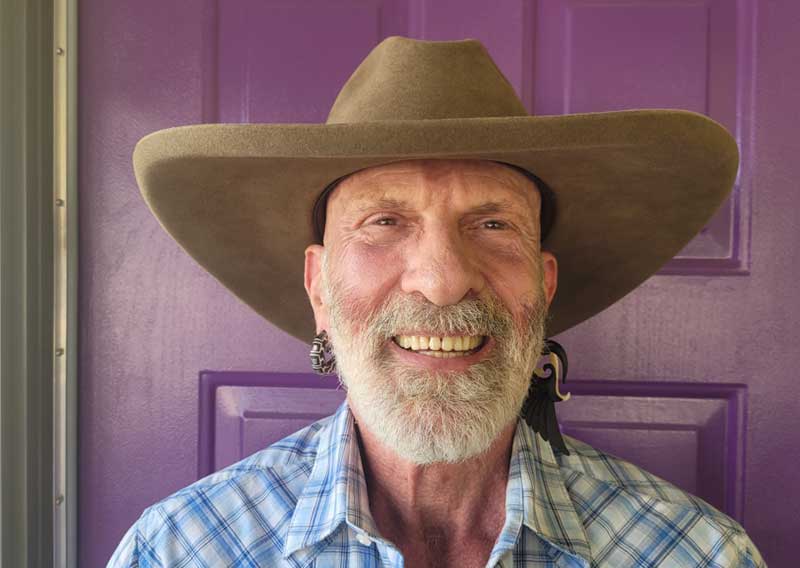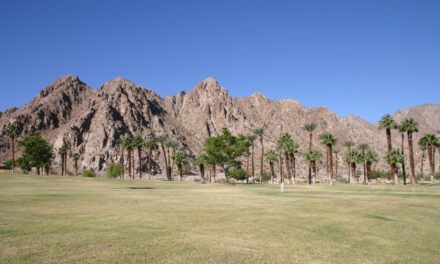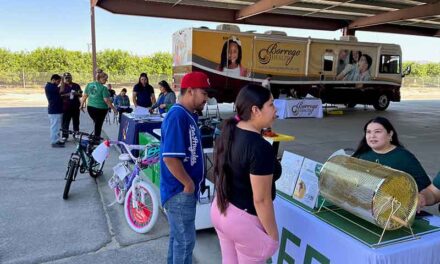Andrew Alder-Larue has lived in the Coachella Valley for more than 20 years
Andrew Alder-Larue is one of three qualified candidates vying for a seat on the Mission Springs Water District board of directors representing District 5.
He is seeking the seat Steve Grasha has held for the past four years. Grasha is not seeking reelection.
The other two candidates are Alan “Alfie” Pettit and Ted Mayrhofen. Uken Report reached out to all three candidates with identical questions. Only Pettit and Alder-Larue responded. Following are Alder-Larue’s responses.
UR: Who or what motivated you to run for the MSWD Board of Directors?
Andrew V. Alder-Larue: My husband, Don, and I moved to Desert Hot Springs in early April 2022 after buying a home in the Vista Montana 55+ community; we sold our home in Cathedral City after having lived there since 2017. Both of us have been residents of the Coachella Valley for over 20 years. Upon our arrival in DHS, we began to attend community events and other activities in order to meet new people and to learn more about our new home. In June we attended an event at the DHS Public Library that was sponsored by the Mission Springs Water District, “Water 101”, a program designed in inform the community about our local water situation and about the history and role of MSWD in the stewardship of this essential resource, water. I had introduced myself at this event and spoke briefly about my history as a lawyer in this State which has included a long history of lobbying state and national elected officials regarding HIV / AIDS and other issues. I also spoke briefly of my work in Europe with a NGO based in Brussels and Den Haag, the Institute for Environmental Security, which has mainly involved working with a group of retired Chiefs of Staff from armies, navies and air forces around the world on the national security aspects of climate change, work which has touched directly on the policies and politics of water security. In seeking a way to make a contribution to the community in which we live, when I learned that there was to be an open seat on the MSWD Board of Directors I determined to run for that office, feeling that my background and experience could make a contribution to MSWD and the citizens it serves.
UR: If elected, what knowledge, experience and/or expertise would you bring to the role?
Andrew V. Alder-Larue: My long career as a California lawyer has given me insight into the importance of localized input whenever legislators and regulators seek to form and shape the contours of public policy. It is, therefore, important to recognize that “localized input”, consisting of the thoughts and ideas of those who will be affected by legislative and/or regulatory decision making, is best achieved by paying careful attention to those voices. Listening to, and comprehending, what folks have to say is decidedly more complex and nuanced an endeavor than is often thought. My experience in litigation, in sitting through many hundreds of depositions where scores of lawyers would attempt to extract information from a now-elderly former shipyard worker rendered ill late in life due to workplace exposure to asbestos, revealed just how little the voices of ordinary people are really heard, much less understood, by a power structure so very remote from their lives. My entire professional career has been premised on trying to help people navigate a system that professes deep interest but whose structures are too often built to either stymie or actively thwart real participation by those who are all-too-frequently not invited to the table, as it were. MSWD is a local water agency, but precisely because of its mundane presence in the lives of those it serves its actions affect everyone in its purview in a very real way. My hope is that my presence on the board can be a voice for those in this community who may feel their views are unheard or unrecognized. Despite any other label that can be assigned to us by virtue of our work or our background, we are all citizens, and as such we have a very real responsibility to be active participants in the process of governance. My candidacy for this board position is a reflection of my desire to both participate on my own behalf and advocate on behalf of others.
UR: What makes you a better fit than your opponent for the position?
Andrew V. Alder-Larue: Don, my husband, and I live full-time in Vista Montana, situated squarely within the boundaries of Division 5 of the MSWD; we bought our home in this community earlier in 2022, and though we are new to Desert Hot Springs as residents, we are both long-time residents of the Coachella Valley. As homeowner in, and resident of, the area I seek to represent I can firmly assert that my interest in this post is that of a resident directly affected by decisions taken by the MSWD board as a whole. Moreover, as noted above, my professional background and my education render me uniquely suited to understand the workings of the MSWD and to appreciate the context in which the agency operates and to effectively interpolate agency decisions to the public it serves.
UR: Is the MSWD doing enough in the area of conservation? Why or why not? If not, what do you believe should be done?
Andrew V. Alder-Larue: I am of the opinion that Mission Springs Water District has developed a robust program of encouraging its users to both be cognizant of their household water usage and to take steps to conserve where and when possible. In a sense the concept of water conservation is somewhat like the proverbial “low-hanging fruit.” Development of policies that encourage resource conservation are without question, high on the list of priorities of any utility or resource service provider. One cannot open a phone or read a newspaper or watch any television news program without receiving the message that conservation is no longer an optional activity for any individual or household. The larger backdrop of climate change notwithstanding, California’s history with regard to water has often been characterized as boom-or-bust, with bust, or drought, being the more prominent aspect. I’ve lived in this state almost continuously since 1978 and well know that water, or its lack, has been an almost constant theme throughout that time. And of course, no one who knows anything about California history knows that the growth of Southern California was made possible through a long, and often, violent struggle to move vast quantities of water from areas of plenty to the arid LA basin. Population growth is made possible by the availability of water, and the availability of water further enables even more growth. In our desert environment conservation cannot be merely an option, rather it must inform every decision made by each of us as consumers and by every water agency as well. Has MSWD done a good job with regard to conservation? Undoubtedly. Could MSWD do more to foster conservation and wise water usage? Without question. But any program, no matter how well designed, will not bear fruit in the absence of active customer engagement; all of us live in a desert environment, one that will only becoming more challenging in the years ahead. Conservation can only succeed if it is seen as a partnership between the supplier of community water and those who consume water. If elected to the MSWD Board Of Directors for Division 5 I will seek to improve and enhance that partnership.
UR: What is your No.1 priority if elected and how will you achieve it knowing you’re only one vote on the board?
Andrew V. Alder-Larue: My number one priority if elected will be to go out into Division 5 so that I can introduce myself to the residents and to ask them about their concerns regarding water. One cannot come to judgement on any issue without first educating oneself about all aspects of that issue; knowing the views of those who put me into post are crucial to allow to effectively represent them. Beyond that, I learned long ago as a trial lawyer that trying to convince a jury of the merits of your client’s position is not an easy task, and the only effective means of persuading a group of strangers to “vote your way” is by effective, competent communication. And the ability to communicate effectively is not limited by one’s skill at articulating one point or another, because hand-in-glove with expressing what “you” want is the equally necessary ability to learn what someone else wants. Respect and comity go a long way in allowing board colleagues to actually hear and understand one’s position and making a genuine attempt to hear and understand an opposing position allows one to find common ground. At the end of the day any elective body must, as a body, take a position, but how one arrives at the decision is almost as important as the decision itself.
UR: Do you believe MSWD should consolidate with DWA? Why or why not?
Andrew V. Alder-Larue: No. Consolidation in any context may well be of some benefit, but the question that must always be asked, I believe, is less the degree to which benefit will be conferred and more to the question of whom will such benefit advantage? There are doubtless those who would argue for such agency consolidation, and without much effort one can likely discern the grounds proffered for such: Efficiency, economies of scale (in terms of capital expenditures and the like) and its handmaiden of asserted increased productivity are just some of the standard rationales usually given when any type of consolidation is proposed. I will also observe that it often seems proponents of consolidation are usually the same folks who would intend (whether stated or not) that they, not others, would be the better stewards of the resultant post-consolidation scheme. The real question, it seems to me, is whether or not the constituents of Division 5 in the Mission Springs Water District are better served by remaining within the structure of a smaller, well-organized entity that is, by definition, truly local or whether the residents of Desert Hot Springs shall, in any significant way, benefit from its incorporation into the DWA. To date I have seen no compelling data, or rationale, that such would in fact be the case. Perhaps I can be educated otherwise, but I am not unaware that proponents of consolidation can sometimes be motivated by factors other than “efficiency.”
Image Sources
- Andrew V. Alder-Larue: Andrew V. Alder-Larue







